Hundreds of thousands of FortiGate firewalls are vulnerable to a critical security issue identified as CVE-2023-27997, almost a month after Fortinet released an update that addresses the problem.
The vulnerability is a remote code execution with a severity score of 9.8 out of 10 resulting from a heap-based buffer overflow problem in FortiOS, the operating system that connects all Fortinet networking components to integrate them in the vendor’s Security Fabric platform.
By infosecbulletin
/ Wednesday , June 18 2025
Russian cybersecurity experts discovered the first local data theft attacks using a modified version of legitimate near field communication (NFC)...
Read More
By infosecbulletin
/ Tuesday , June 17 2025
Cybersecurity researcher Jeremiah Fowler discovered an unsecured database with 170,360 records belonging to a real estate company. It contained personal...
Read More
By infosecbulletin
/ Tuesday , June 17 2025
GreyNoise found attempts to exploit CVE-2023-28771, a vulnerability in Zyxel's IKE affecting UDP port 500. The attack centers around CVE-2023-28771,...
Read More
By infosecbulletin
/ Tuesday , June 17 2025
The U.S. Cybersecurity and Infrastructure Security Agency (CISA) has recently included two high-risk vulnerabilities in its Known Exploited Vulnerabilities (KEV)...
Read More
By infosecbulletin
/ Monday , June 16 2025
SafetyDetectives’ Cybersecurity Team discovered a public post on a clear web forum in which a threat actor claimed to have...
Read More
By infosecbulletin
/ Sunday , June 15 2025
WestJet, Canada's second-largest airline, is looking into a cyberattack that has affected some internal systems during its response to the...
Read More
By infosecbulletin
/ Saturday , June 14 2025
Resecurity found 7.4 million records of Paraguayan citizens' personal information leaked on the dark web today. Last week, cybercriminals attempted...
Read More
By infosecbulletin
/ Friday , June 13 2025
HashiCorp has revealed a critical vulnerability in its Nomad tool that may let attackers gain higher privileges by misusing the...
Read More
By infosecbulletin
/ Friday , June 13 2025
SoftBank has disclosed that personal information of more than 137,000 mobile subscribers—covering names, addresses, and phone numbers—might have been leaked...
Read More
By infosecbulletin
/ Friday , June 13 2025
Serious security vulnerabilities in Trend Micro Apex One could allow attackers to inject malicious code and elevate their privileges within...
Read More
CVE-2023-27997 is exploitable and allows an unauthenticated attacker to execute code remotely on vulnerable devices with the SSL VPN interface exposed on the web. In an advisory in mid-June, the vendor warned that the issue
may have been exploited in attacks.
Fortinet addressed the vulnerability on June 11 before disclosing it publicly, by releasing FortiOS firmware versions 6.0.17, 6.2.15, 6.4.13, 7.0.12, and 7.2.5.
ALSO READ:
Daily Cybersecurity update, July-03, 2023
Offensive security solutions company Bishop Fox reported on Friday that despite the calls to patch, more than 300,000 FortiGate firewall appliances are still vulnerable to attacks and reachable over the public internet.
Bishop Fox researchers used the Shodan search engine to find devices that responded in a way that indicated an exposed SSL VPN interface. They achieved this by searching for appliances that returned a specific HTTP response header.
They filtered the results to those that redirected to ‘/remote/login,’ a clear indication of an exposed SSL VPN interface.

The query above showed 489,337 devices but not all of them were vulnerable to CVE-2023-27997, also referred to as Xortigate. Investigating further, the researchers discovered that 153,414 of the discovered appliances had been updated to a safe FortiOS version.

This means that roughly 335,900 of the FortiGate firewalls reachable over the web are vulnerable to attacks, a number that is significantly higher than the 250,000 recent estimation based on other, less accurate queries, Bishop Fox researchers say.
Another discovery Bishop Fox researchers made was that many of the exposed FortiGate devices did not receive an update for the past eight years, some of them running FortiOS 6, which reached end of support last year on September 29.
These devices are vulnerable to several critical-severity flaws that have proof-of-concept exploit code publicly available.
To demonstrate that CVE-2023-27997 can be used to execute code remotely on vulnerable devices, Bishop Fox created an exploit that allows “smashes the heap, connects back to an attacker-controlled server, downloads a BusyBox binary, and opens an interactive shell.”
“This exploit very closely follows the steps detailed in the original blog post by Lexfo […] and runs in approximately one second, which is significantly faster than the demo video on a 64-bit device shown by Lexfo,” Bishop Fox notes in their
report.
Source: Bleepingcomputer



 InfoSecBulletin Cybersecurity for mankind
InfoSecBulletin Cybersecurity for mankind














